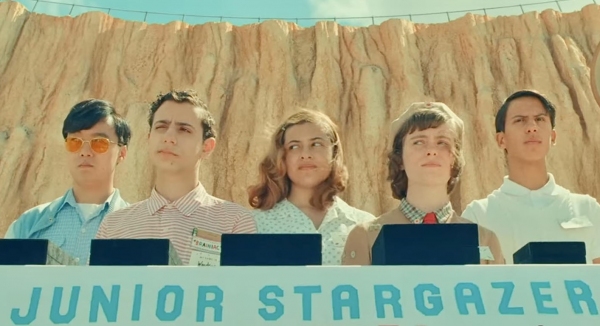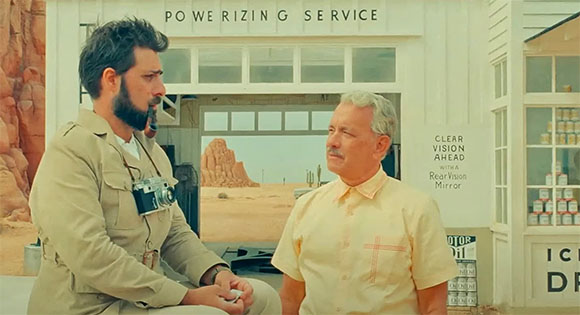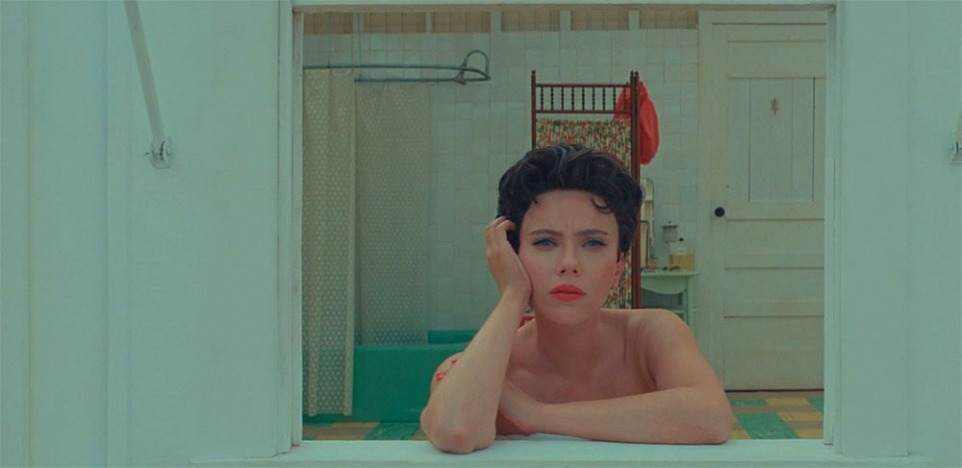The 1950s were marked by a post-World War II economic boom characterized by new cars, suburban houses, and a deluge of consumer goods. While many Americans were caught up in the prosperity imprinted on their souls by radio and television, other more sensitive citizens were frightened by the terrible trinity of communism, the dawn of the Cold War, and the A-bomb tests.
“Human beings construct meaning as spiders make webs. This is how we survive our primary evolutionary business.”
Catherine Bateson in Peripheral Visions
Asteroid City boasts director Wes Anderson’s usual blend of creative characters and colorful production values. The story, co-written by Anderson and Roman Coppola, takes place in 1955 in a desert town serving as the set for a theatrical production. There is a motor court, a diner, a huge crater made by an asteroid thousands of years ago, a gas station, and a ramp closed indefinitely, presumably because it ends in mid-air; occasionally we see the mushroom cloud of an atom bomb test in the distance.
Brian Cranston hosts a black-and-white television show being made of the play. The playwright (Edward Norton) and a director (Adrien Brody) seem to have rather fluid visions of the story.
“We must remind ourselves that, though our lives are small and our acts seem insignificant, we are generative elements of this universe, and we create meaning with each act that we perform or fail to perform.”
Kent Nerburn in Make Me an Instrument of Your Peace
The main characters arrive in Asteroid City for a Junior Stargazers’s Convention and an awards ceremony sponsored by the U.S. Military and Science Research and Experimental Division. Augie Steenbeck (Jason Schwartzman), a war photographer, has brought his three young daughters and son to the convention. Even though they are smart and sassy “brainiacs,” they are not equipped to deal with the surprise their father and grandfather (Tom Hanks) has for them. They and the other families settle into the motel where the manager (Steve Carell) sells tiny parcels of desert land through a vending machine.

Also trying to unravel the mysteries of life are Midge Campbell (Scarlett Johnson) as a glamorous movie star, Maya Hawke as a busy teacher trying to control a group of schoolchildren visiting the tourist site, and Tilda Swinton as a perplexed scientist. Representing the establishment is a five-star general (Jeffrey Wright) who is to emcee the awards ceremony. Meanwhile Augie’s son (Jake Ryan) and Midge’s daughter (Grace Edwards) strike up a friendship and play word games with the other Stargazers.
Wes Anderson is known for creating distinctive environments and plucking his characters down in them to figure out what to do next and why. This story gets more complicated when a spaceship lands in the middle of the movie set and an extraterrestrial takes the town’s namesake asteroid. “I didn’t like the way the alien looked at us,” says Augie, “as if we are doomed.” Put under quarantine, they are now the center of worldwide attention!

Also typical of Anderson’s films is the presence of a few cryptic lines that may just explain the movie – or maybe not. Here we are advised to “just keep telling the story” and “You can’t wake up if you don’t fall asleep,” lyrics from the song by Jarvis Cocker. That one reminds us of the spiritual lesson that it may be necessary to examine what has you stuck and going nowhere (i.e. asleep) before you can truly wake up and grow into a new life.
“Meaning does not come to us in finished form ready-made; it must be found, created, received, and constructed. We grow our way toward it.”
Ann Bedford Ulanov, American Jungian analyst
